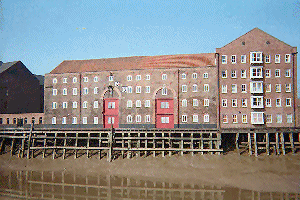
Hull Haven - embarkation point
|
|
Between the end of the Seven Years War in 1763
and the outbreak of colonial hostilities in the following decade, emigration
from rural Yorkshire was of major importance. The greatest area of
attraction was Nova Scotia owing to a number of "push" and "pull" factors:
at home, certain landlords were greatly increasing rents with a subsequent
proportional rise in tax liability; agents from Nova Scotia were busy in
the North and East Ridings promoting Nova Scotia. Especially active in
this propaganda was Michael Francklin (one time Lieutenant-Governor of
Nova Scotia) and his agents who arrived in Yorkshire in 1772, offering
500-acre grants of freehold land, free passage and no taxes during the
first years (not exactly true, but nevertheless, the proposition was highly
attractive in light of the uncertainty and rent increases). Many
accepted the offer, sailing from Liverpool.
By 1774 many ship owners on the Yorkshire coast
saw the potential of carrying emigrants to the New World, and returning
with a cargo of Canadian lumber. Subsequently, between 1774 and 1776,
until the War of Independence broke out, eleven ships set sail and carried
an estimated 1,000 Yorkshire emigrants to Nova Scotia. They sailed
from Whitby, Scarborough and, most importantly (as a precedent for emigration
the following century) from Hull.
Some returned home dissatisfied, some moved on
to other areas (like Miles I'Anson and his
family who moved to New Jersey) but the majority stayed and settled in
Nova Scotia. Nova Scotia celebrated this great Yorkshire immigration
in Yorkshire 2000.
For further information on the Yorkshire Emigration see:
Why did Miles I'Anson and his family then leave Nova Scotia and
end up in New Jersey, at a time of turmoil (the American Revolution)?
One possibility is that Miles was involved in the Eddy
Rebellion (The rebels were convinced they could get George Washington
to invade Nova Scotia and make it the 14th state) |